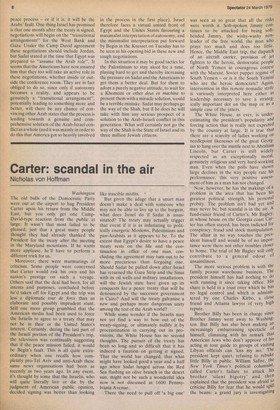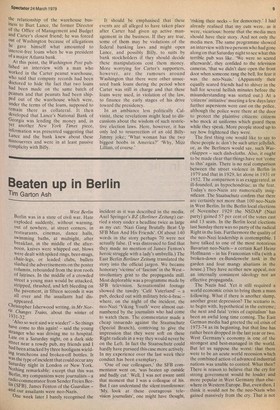Carter: scandal in the air
Nicholas von Hoffman
Washington The old bulls of the Democratic Party were out at the airport to hug President Carter upon his return from the Middle East, but you only get one CampDavid-type reaction from the public at large. It wasn't that most failed to be pleased, just that a great many people thought they had already thanked the President for the treaty after the meeting in the Maryland mountains. If he wants more applause, he'll have to perform a different trick for us.
Moreover, there were murmurings of criticism. Some people were concerned that Carter would risk his own and his nation's prestige on such a voyage. Others said that the deal had been, for all intents and purposes, concluded before he'd taken off for Egypt and the trip was less a diplomatic tour de force than an elaborate and possibly imprudent stunt. Still one more group grumbled that the American media had been used to force the Israelis to agree to a treaty that may not be in their or the United States's interest. Certainly, during the last part of the Israeli portion of the President's trip, the television was continually suggesting that if the peace mission failed, it would be Begin's fault. This is all quite extraordinary when one recalls how completely pro-Tel Aviv and anti-Arab these same news organisations had been as recently as two years ago. In any event, it's thought by some that the Israelis, who will quite literally live or die by the judgment. of American public opinion, decided signing was better than looking like irascible misfits.
But given the adage that a smart man doesn't make a deal with someone who may not be able to live up to the bargain, what does Israel do if Sadat is assassinated? The treaty may actually trigger that event if it is as infuriating to politically energetic Moslems, Palestinians and pan-Arabists as it appears to be. To the extent that Egypt's desire to have a peace treaty rests on the life and the continuation in office of one man, concluding the agreement may turn out to be more precarious than forgoing one. Should Sadat be pulled down after Israel has returned the Gaza Strip and the Sinai with its oil wells and military installations, will the Jewish state have given up its conquests for a peace treaty that will be denounced by the successor government in Cairo? And will the treaty galvanise a new and perhaps more dangerous unity among the rest of the Arab world?
While some wonder if the Israelis may not yet find a way to bow out of the treaty-signing, or ultimately nullify it by procrastination in carrying out its provisions, the White House has no second thoughts. The pursuit of the treaty has been so long and so difficult that it has induced a fixation on getting it signed. That the world has changed, that what might have looked good a year and a half ago when Sadat lunged across the Red Sea flashing an olive branch in the desert sun, might not be such a wonderful idea now is not discussed at 1600 Pennsylvania Avenue.
There the need to pull off 'a big one' was seen as so great that all the risks were worth it. Soft-spoken Jimmy continues to be attacked for being softheaded Jimmy, the wishy-washy nonleader of the free world, the man who prays too much and does too little. Hence, the Middle East trip, the dispatch of an aircraft carrier, provision of jet fighters to the heroic, democratic people of North Yemen in courageous contest with the Marxist, Soviet puppet regime of South Yemen — or is it the South Yemini who are the heroic democrats? Again, intervention in this remote nomadic strife is variously interpreted here either as leadership necessary to save a strategically important dot on the map or as a simple case of the jitters.
The White House, as ever, is underestimating the president's popularity and forcing action that is really not expected by the country at large. It is true that there are a scarcity of ladies working on needlepoint likenesses of the great Georgian to hang over the mantle next to Abraham Lincoln, but Carter is still widely respected as an exceptionally moral, genuinely religious and very hard-working man. Even when the polls have shown large declines in the way people rate his performance, this very positive assessment of him as a man has not changed.
Now, however, he has the makings of a problem in the area that has been his greatest political strength, his personal probity. The problem isn't bad yet and may never be, but scandal is in the air. A fund-raiser friend of Carter's, Mr BagleY, at whose house on the Georgia coast Carter has often stayed, has been indicted for conspiracy, fraud and stock manipulation. The affair in no way touches the president himself and would be of no importance were there not other troubles closer to home. The trial of Mr Bagley will only contribute to a general odour of unsaintliness.
The more serious problem is with the family peanut warehouse business. The president himself has had nothing to do with running it since taking Office. His share is held in a trust over which he has no legal control and which is administered by one Charles Kirbo, a close friend and Atlanta lawyer of very high repute. Brother Billy has been in charge since Brother Jimmy went away to Washington. But Billy has also been making an increasingly embarrassing spectacle of himself, climaxing with his remark that American Jews who don't approve of his acting, as tour guide to groups of visiting Libyan officials can 'kiss my ass.' The president kept quiet, refusing to rebuke little Billy in public. William Safire, the New York Times's political columnist, called Carter's failure to attack his brother 'silent bigotry' and then explained that the president was afraid to criticise Billy for fear that he would spill the beans: a grand jury is investigating the relationship of the warehouse business to Burt Lance, the former Director of the Office of Management and Budget and Carter's closest friend; he was forced out of Washington because of allegations he gave himself what amounted to interest-free loans when he was president of a major Atlanta bank.
At this point, the Washington Post published an interview with a man who worked in the Carter peanut warehouse, who said that company records had been doctored to hide the fact that two loans had been made on the same batch of Peanuts and that peanuts had been shipped out of the warehouse which were, under the terms of the loans, supposed to remain there as collateral. It then developed that Lance's National Bank of Georgia was lending the money and, in Yet another New York Times piece, information was presented suggesting that Lance and the bank knew about these manouevres and were in at least passive Complicity with Billy. It should be emphasised that these events are all alleged to have taken place after Carter had given up active management in the business. If they are true, some of them may be violations of the federal banking laws and might open Lance, and possibly Billy, to suits by bank stockholders if they should decide these manipulations cost them money. More worrying for Carter's supporters, however, are the rumours around Washington that there were other unsecured bank loans during the period when Carter was still in charge and that these loans were used, in violation of the law, to finance the early stages of his drive toward the presidency.
In an ambiance less politically Calvinist, these revelations might lead to discussions about the wisdom of such restrictive election laws. Here, however, it has only led to resurrection of an old BillyJimmy joke; 'What woman has the two biggest boobs in America?"Why, Mizz Lillian, of course.'



































 Previous page
Previous page